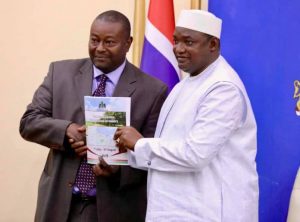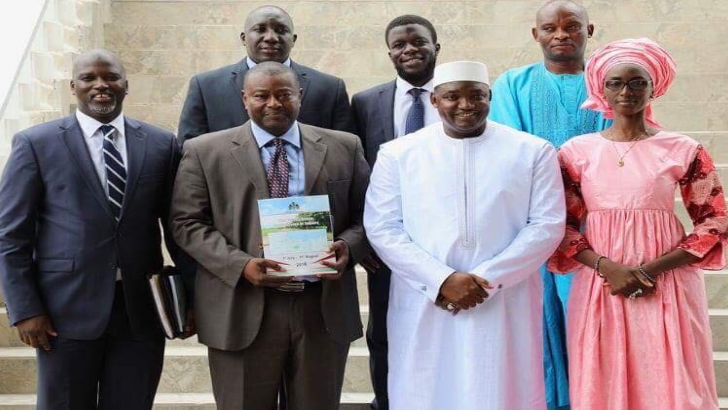By Kebba Ansu Manneh
The National Assembly of The Gambia, on 18 September 2018, approved retroactive payments in the sum of one hundred and fifty thousand dalasis (D150, 000) to each of the five members of the Faraba Banta Commission of Inquiry. The payments for commissioners for their two months’ work, amounted to seven hundred and fifty thousand dalasis (D750,000.00) in total.
Advancing his justifications for these payments, the Attorney General and Minister of Justice, Abubacarr Tambadou, argued that “given the intensity involved in the work of the commissioners, couple with the full-time commitment of members for a period the two full months, as well as the nature and complexity of the evidence adduced by the numerous witnesses before the commission, and the fact that the commissioners have suspended all their professional carriers to devote time to the work of the commission are reasons that should warrant the payments of the commissioners.”
He said the commission’s Chairperson Emmanuel Daniel Joof, with four other members namely Abdoulie Colley, Omar Cham, Lt. Yusupha Jallow, and Neneh Cham should be paid this amount for their two months of work. This request, Tambadou added, is in pursuant of Section 16, Subsection 1 of the Commission of Inquiry Act, which states that “commissioners appointed under

this act are not entitled to any remuneration beyond the actual expenses incurred in holding the inquiry unless such a remuneration is specifically voted by the National Assembly.”
“As I did for the Janneh Commission a few times, I am here again to request for your approval for the remuneration for the Faraba Banta Commissioners. I believed that they have done an important work in not only establishing truth about the tragic events at Faraba Banta on the 18 June, 2018; but they were mandated, and they did consider making recommendations on how to prevent a similar occurrence in order parts of the country,” Tambadou stated as he appealed to deputies to approve the payment for Faraba Banta Commissioners.
In seconding the motion before the National Assembly, Demba Sowe, member for Niamina East constituency said the commissioners were competent, energetic and very intellectual people who were tasked to investigate the Faraba Banta incident. He argued that the money asked by the Minister of Justice is “little compensation we have to give to these commissioners, is not actually a payment for me.” Sowe added the commissioners were “humble enough to carry out the work, because of the urgency of this issue, they were able to carry out this task without asking for their payment.”
Halifa Sallah, member for Sere Kunda constituency said, “collaboration between the executive and legislature led to this recommendation, and maybe proactive action, by the executive; either way, both institutions were of the view that a commission of inquiry should be established to look into the matter.”
He urged the Attorney General to conduct an ultimate review of the very provision of the law to look at its constitutionality, stating that “if you look at the Constitution under Section 101 (4) (ii) it sort of aims to forbid the imposition of any charges on the consolidated revenue funds or any other public funds of The Gambia or the alteration of any such charges. It seems that the National Assembly is restricted in really interfering with the consolidated funds.”
In enquiring on the legality of the retroactive payments to the five commissioners, Saikouba Jarju, National Assembly Member for Busumbala constituency, argued that “the debate should have been on the remunerations before they start the job and as these people have already started the job, so what went wrong?” In responding later in the debate, Tambadou said the act did not state when commissioners should be remunerated justifying the retroactive payments. Ndey Yassin Secka-Sallah, a nominated member, expressed concerns on the spending and wondered “where the money is coming from and hope it would not affect” the national budget.
After a few more members intervened and without any objection on the payment or calls for reduction of proposed payouts, deputies approved the payments to members of the Faraba Banta Commissioners. Following the passage of the bill, many Gambians, both at home and in the diaspora, turned to social media to criticize the payments as excessive, unreasonable, and a misappropriation of the meager resources of the country.
Speaking to The Gambia Times, Ousman Sillah, a member of the National Assembly for Banjul North constituency, lamented it’s rather unfortunate that Gambians are not doing such jobs voluntarily for their nation but for remuneration. Even though it’s the National Assembly that approved the payments, Sillah stated that it is left to the Gambian people to decide whether the amount paid to the Faraba Banta commissioners is reasonable or excessive.
Sillah stressed that given the financial situation of the country he would have served as a member of the commission without asking for a dime from the state. “I wouldn’t ask the government for a pay if I were given the opportunity to serve on the commission, I would have done this for free as a national duty,” Sillah noted. He, however, accepted the justification to pay the commissioners the money they have worked for and demanded to be paid.
Sillah further argued that even though the monies spent on the various commissions may be excessive and costly to the state, but these are necessitated by the promise made by the transitional government to the Gambian people that it will embark on reforms.
He said these reforms are necessary in order to put The Gambia on a strong footing so as to ensure good governance, rule of law and transparency.
“This is the agreement Barrow government has with the people and spending public monies in this dimension is not entirely wasteful spending,” Sillah advanced.
Sillah urged Gambians to inculcate the spirit of voluntarism so as to save money for the country, adding that many Gambians put money before national interest.
M. C. Cham, the national youth mobilizer for The Gambia Democratic Congress (GDC) , an opposition party, said, “I understand it takes a lot to establish a proper Commission but if the Commission members are ready to sacrifice for their country’s development, they should be able to demand at least half of what they have been paid for the two months job. The balance could have been spent on some other national development issues.”
Cham observed that Barrow’s government has not prioritized development of key sectors and is only engaging in wasteful spending on per diems at the expense of poor Gambians. What the government officials are doing, he noted further, is to spend the nation’s meager resources on so-called commissions that have not yielded any dividend for the country for nearly two years since President Barrow took over the affairs of the nation.
“Government has lavishly spent huge money on the Janneh Commission and other Commissions, yet we have not seen any amount that they have recovered. When shall the suspects be prosecuted and our monies be recovered,” he questioned.
He said President Barrow’s government has extended the Janneh Commission twice to investigate the past but at the same time employed some of the suspects being investigated by the commissions into key positions. He said such actions are ridiculous and thus show totally misplaced priorities of the government.
Cham also disclosed that there is a need for the government to cut down spending and work hard to improve the country’s economy. He added that the Forbes Magazine, a U.S. publication, ranked The Gambia as the second worst place to do business among the one hundred and fifty-three countries it surveyed around the globe.
“People are hungry in this country and the government is not doing much to improve our economy. Salaries are poor, taxes are high, food is expensive and there is no employment especially for the young people,” Cham concluded.
Pa Samba Jow, a prominent Gambian civil rights activist, remarked that, “I can understand the need for a commission especially the Faraba Banta Commission, but the amount of money spent on these commissioners is excessive.” He said it would be imperative for members of the Barrow government to be extremely mindful of the horrible state of the Gambian economy they inherited, adding that great efforts must be made to avoid anything that may look like unnecessary spending.
Jow noted most Gambians are beginning to lose faith in these commissions because they find the salaries been paid are absolutely excessive.

